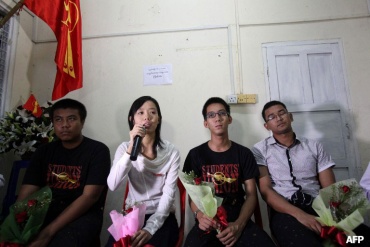The announcement by the office of President Thein Sein that a committee will be formed to review political prisoner cases in Burma [Myanmar] could represent a major breakthrough in solving the issue of political prisoners. While hundreds of political prisoners have been released in the past two years, there have been disagreements about how many remain in jail. The figure is certainly in the hundreds, and could be much higher.

Much will depend on exactly how the committee is formed, who is on it, and what its mandate will be. This information will be critical in assessing whether this is a genuine attempt to resolve the issue of political prisoners or merely yet another half-measure designed to alleviate international pressure.
It is not unreasonable that there will be doubts about how genuine Thein Sein’s intentions are, given both the timings of the announcements and his track record. He is no stranger to using committees as a delaying tactic to alleviate international pressure. The most notorious example was chairing a committee to end the recruitment of child soldiers, starting back in 2004. This is an issue still not resolved today.
Thein Sein first announced this committee just ahead of President Obama’s visit. Now three key deadlines are coming up. The next Human Rights Council session is starting later this month and Thein Sein is trying to ensure the Special Rapporteur’s mandate is not renewed. He is also embarking on a tour of Europe later this month, and is well aware that by the end of April, the EU has to make a decision on whether to continue the suspension of sanctions.
Neutralising the issue of political prisoners is essential to him.
One of the key issues that will help in an assessment of how genuine Thein Sein is will be the composition of the committee. There must be independent international experts involved. Without this the credibility of the committee will be in doubt, both in terms of having genuinely independent members and in terms of its expertise. Civil society involvement is also crucial.
It is a good sign that organisations such as the Assistance Association for Political Prisoners–Burma, 88 Generation Students and National League for Democracy have been informally approached about joining the committee. Representatives of other civil society organisations, including ethnic representatives, must also be included.
The committee will decide on the definition of political prisoners. This definition will be critical. While some laws are obviously repressive and designed to target political activists, in other cases general laws are misapplied in order to jail activists. In addition, an essential but for some also controversial inclusion must be those political prisoners from Burma’s armed ethnic groups. This will be essential for building long-term peace in the country.
It is not yet clear how cases of people who could potentially be political prisoners will be chosen. The committee should have the freedom to independently take up any case it chooses. In addition, anyone who believes that they are in jail for political reasons should be allowed to submit their case to the committee. To ensure that there is no intimidation of political prisoners to prevent them submitting cases, the submission of cases by third parties, both domestic and international, should also be allowed.
Most political prisoners released so far have only been released conditionally. Any releases made as a result of this committee’s work must be full unconditional pardons, and this must also apply to those political prisoners who have already been released.
It is not clear if the committee is temporary and will close after submitting its report to the President. The committee needs to be permanent as almost every repressive law is still on the books, and people are now being arrested and jailed under new laws supposedly giving people more rights, such as the so-called right to protest law.
The repressive laws that are used to jail political prisoners must also be repealed as part of this process. Until all repressive laws are repealed, and until there is the rule of law, there will continue to be a need for this committee to review individual cases.
Many political prisoners suffer health problems, including mental health problems, as a result of being kept in appalling conditions and/or torture. The families of political prisoners also face severe financial problems. No political prisoners released so far have been offered any compensation and support for costs such as healthcare. Freed political prisoners should be entitled to free healthcare, and given compensation and support to rebuild their lives.
The release of political prisoners will naturally be part of a process, but it must not be forgotten that justice and accountability must be part of that process. Political prisoners should never have been in jail in the first place, and there must be some form of justice, accountability and reconciliation. To date, Thein Sein has never admitted that political prisoners should not have been jailed, and has never apologised.
If the mandate and composition of the committee allows it to address these critical issues, then this really will be a breakthrough. If these issues are not addressed, a real opportunity will have been lost, and we will have our answer about whether or not President Thein Sein genuinely wants to address this problem.



